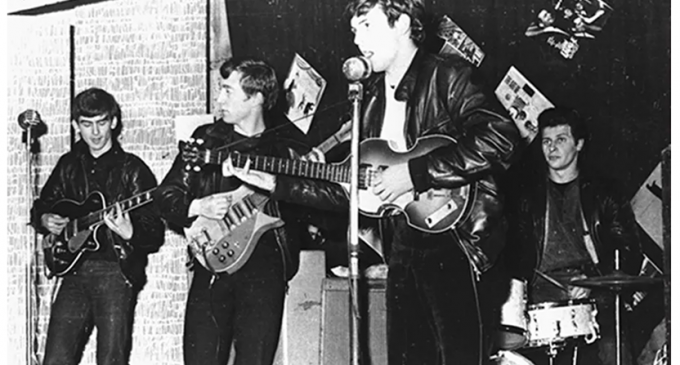The greatest Beatle? Pete Best | The Spectator

Happy Birthday Pete Best!
Which of the Beatles would you most like to have been? Not either of the dead ones, presumably. Nor the one continually derided for his alleged lack of talent. Definitely not the embarrassing, gurning, two-thumbs-up uncool one…
Anyway, it’s a trick question. The correct answer, at least it is for me after watching The Beatles: Made on Merseyside (BBC4, Friday), is Pete Best — the drummer who got ousted just before the band got big because he was too good-looking, too quiet and, some say, because Brian Epstein couldn’t handle his mum’s pushiness.
Best, I’d always imagined, was the unluckiest man in history. So when he was featured on the documentary talking fondly about the Hamburg years and about how John Lennon was always his hero, I kept waiting for the bit where his throat cracked, his eyes misted up and he looked away from the camera, temporarily unable to continue.
Not a bit of it. Best, it turns out, remains a twinkly-eyed, cheery cove, more than reconciled to his place as a footnote in history, delighted to have spent his recent career — after a 20-year stint in the civil service — as a touring musician playing the kind of raw rock’n’roll the band did in Hamburg. Possibly the £1 million or so he got in royalties from the Beatles’ Anthology 1 helped. Even so, as an exemplar of triumph over adversity, enduring happiness snatched from transient misery, Best does seem a pretty useful role model for all those of us who don’t even have a ‘Yellow Submarine’ in them, let alone an ‘Eleanor Rigby’ or a ‘A Day In the Life’.
There have been innumerable documentaries about the Beatles and I dare say there was nothing in this one that more obsessive aficionados wouldn’t have known already. How they got their name, for example. The theory floated here, with an air of final authority, was that it was half inspired by their heroes the Crickets (as in Buddy Holly and…), but actually came from the biker chicks riding pillion (clinging on like beetles) in the Marlon Brando film The Wild One. Except I see from the internet that the film was banned in the UK until 1968 and that the first time any Beatle even alluded to the connection was George Harrison in 1975. So I think we’ve long since passed the stage where the facts can be discerned from the myth.
Still, I enjoyed it — not least for the light it shed on one of the strangest mysteries in pop history: how exactly did a bunch of average (or so Paul McCartney boasted in an early interview) musical talents, ranked even below Howie Casey and the Seniors and Rory Storm and the Hurricanes in the early 1960s Liverpool pop hierarchy, suddenly mutate into a world-beating phenomenon?
A combination of alchemy and will to power, I’d say. You see this time and again with pop stars. (That superb documentary on the invention of David Bowie a couple of months ago was another example.) They start off a bit hopeless and rubbish, but the really determined ones keep grinding away regardless until something magical happens. They spend a year or so paying their dues in Hamburg. Their drummer accidentally develops a distinctive backbeat. The leather jackets they wear for reasons of durable practicality suddenly become iconic. The bass player’s German girlfriend comes up with some striking haircuts. Their sets are so long and frequent they realise they’ll have to write songs of their own because covers are insufficient. A nice upper-middle class Jewish boy has faith and doesn’t give up until they’ve got a deal. The one record label that doesn’t reject them happens to have a genius called George Martin working there…
Remove any single one of these ingredients and you wonder: would the Beatles ever have got as big as they did? And does this mean that in parallel universes some of us are actually the rock gods we’ve always wished we could have been, waking to ecstasy our living lyres in a way that in this world cruel circumstances denied us?
Here’s a trippy bucolic treat that I highly recommend: Paul Wright’s Arcadia (BBC4, iPlayer), a meditation on rural England compromising mash-ups of found footage from the film archive (magnified time-lapse images of growing seeds; shire horses ploughing fields; idyllic villages like the one in Went The Day Well?; Morris men; May queens; fox-hunting; ravers…). All with a ravey soundtrack by Goldfrapp’s Will Gregory and Portishead’s Adrian Utley.
What I appreciated, apart from the The Wicker Man-meets-Penda’s Fen dark craziness of it all, was the near-absence of right-on editorialising. Environmental apocalypse barely got a look-in; even as a fox-hunting fan I didn’t feel the chase scenes were too oppressively anti. Nice one, Paul!




There are no comments at the moment, do you want to add one?
Write a comment